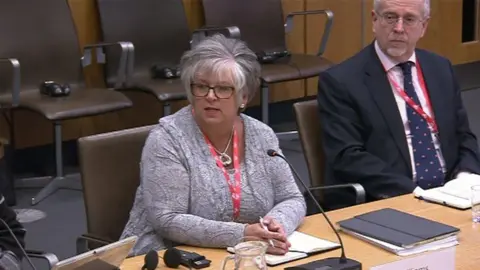Cwm Taf maternity experiences 'complete shock' to chief
 BBC
BBCSenior managers at a health board with "dysfunctional" maternity services admitted the experiences of patients came as a "complete shock" to them.
Cwm Taf Morgannwg health board chief executive Allison Williams said mothers had not been listened to.
A review last month found women at two hospitals had "distressing experiences and poor care".
But the assembly's health committee was told leadership changes could lead to "hesitation and delay" in improvements.
Ms Williams said some of the accounts of the families were "nothing short of heartbreaking".
"We can't make any excuses for that, their experiences were unacceptable on a whole range of levels," she added.
"The failings go right the way through the organisation."
Chairman Prof Marcus Longley said when they heard verbally from the royal colleges review team after a visit in January they were "shocked" at what was revealed and "had not appreciated the full extent of the issues".
Questioned by Merthyr and Rhymney AM Dawn Bowden, Ms Williams said when the health board made the problems public in October , they knew they had a problem around staffing and clinical practices but did not know the extent of the challenges.
"To be absolute frank, the extent of the feedback from families was a complete shock, even to me."
She said the numbers of complaints they were receiving did not reflect the scale of the problems experienced by mothers which have since emerged.
Prof Longley added: "There's a need to review how we handle people who raise issues with us - we haven't done that in any way appropriately".
Ms Williams - who has been chief executive since 2011 - denied a suggestion by Plaid Cymru health spokeswoman Helen Mary Jones that she was more concerned with reputational damage to the health board.
Ms Jones said some families did not understand how change in culture could take place when those who preside over it remain in place and there has been no disciplinary action.
Prof Longley said: "It's very important, I think, that the team who understands these problems and knew intimately now what needs to be done about them are charged with responsibility of getting on with it now.
"To have a change of leadership at this point will only result in hesitation and delay and that I'm sure is something nobody wants."

'I don't think anything is going to change'
Jessica Western, from Rhoose, in the Vale of Glamorgan, said she was not listened to when she could not feel her baby move in the month before the birth.
Her daughter Macie died in March 2018, 19 days after she was born. Ms Western said issues at the Royal Glamorgan Hospital included being ignored, staffing shortages and having to see different consultants. She had a much better experience when Macie was transferred to Cardiff.
She was then frustrated with the complaints procedure - and unhappy with the internal report she received, which she felt had inaccuracies and was about "getting me off their back".
"I tried contacting the Glam numerous times and no-one wanted to help me, so I went to a solicitor," she said.
"I know numerous families who complained who've not had a response. I don't think anything is going to improve and if it is does it's going to take years.
"The people right at the top [of the health board] need to change.
"Any one of them losing their jobs is not going to make me feel better, it's not going to bring Macie back but I think it will bring a lot of reassurance to people having babies now."
Ms Western is now pregnant again but will not go the Cwm Taf hospitals and will use maternity services in Cardiff.

Maternity services are now in special measures and an independent panel will oversee the changes.
Prof Longley added: "The oversight regime has changed completely - the independent panel is starting its work and will scrutinise very closely our response to all the challenges and I hope that will give some reassurance that there can be no slipping on the changes which need to take place.
"There is also the need for us as a health board to get on effectively, quickly and determinedly - to make the changes happen. It would be unfortunate if we dithered and didn't take action now, that would let down people who had raised issues with us."
Some frontline managers were no longer running wards and new people were in post.
But Prof Longley admitted cultural issues were embedded and would take a "long time" to resolve.
Senior managers were asked if they would be happy that the service was safe enough for someone they care to use it.
Ms Williams said the head of midwifery was asked the same question in a recent board meeting and that yes she would be willing. "That's a very powerful reassurance. We recognise that the cultural issues will take time. But there are checks and balances in the system now that were not in the system before."
Committee chairman Dai Lloyd told Gareth Lewis on BBC Radio Wales that the health board saying the extent of the problems came as a shock was "bewildering" and "unacceptable".
He said committee members could now meet families and staff - possibly confidentially.
"We're absolutely determined to get to the bottom of this," he added.
